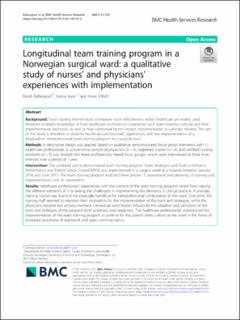| dc.contributor.author | Ballangrud, Randi | |
| dc.contributor.author | Aase, Karina | |
| dc.contributor.author | Vifladt, Anne | |
| dc.date.accessioned | 2021-09-28T06:11:57Z | |
| dc.date.available | 2021-09-28T06:11:57Z | |
| dc.date.created | 2021-09-15T08:32:36Z | |
| dc.date.issued | 2021 | |
| dc.identifier.citation | BMC Health Services Research. 2021, 21, . | en_US |
| dc.identifier.issn | 1472-6963 | |
| dc.identifier.uri | https://hdl.handle.net/11250/2783872 | |
| dc.description.abstract | Background
Team training interventions to improve team effectiveness within healthcare are widely used. However, in-depth knowledge of how healthcare professionals experience such team training curricula and their implementation processes, as well as how contextual factors impact implementation, is currently missing. The aim of this study is therefore to describe healthcare professionals’ experiences with the implementation of a longitudinal interprofessional team training program in a surgical ward.
Methods
A descriptive design was applied based on qualitative semi-structured focus group interviews with 11 healthcare professionals. A convenience sample of physicians (n = 4), registered nurses (n = 4), and certified nursing assistants (n = 3) was divided into three professionally based focus groups, which were interviewed at three time intervals over a period of 1 year.
Intervention
The validated and evidence-based team training program Team Strategies and Tools to Enhance Performance and Patient Safety (TeamSTEPPS) was implemented in a surgical ward at a hospital between January 2016 and June 2017. The team training program included three phases: 1) assessment and planning, 2) training and implementation, and 3) sustainment.
Results
Healthcare professionals’ experiences with the content of the team training program varied from valuing the different elements of it to seeing the challenges in implementing the elements in clinical practice. A one-day training course was found to be especially beneficial for interprofessional collaboration at the ward. Over time, the nursing staff seemed to maintain their motivation for the implementation of the tools and strategies, while the physicians became less actively involved. Contextual ward factors influenced the adoption and utilization of the tools and strategies of the program both positively and negatively. The healthcare professionals’ experienced the implementation of the team training program as positive for the patient safety culture at the ward in the forms of increased awareness of teamwork and open communication.
Conclusions
The study suggests that the implementation of a team training program in a surgical ward is dependent on a set of factors related to content, process, context, and impact. Knowledge on how and why a team training program work supports the transferability to clinical practice in further planning of team training measures. | en_US |
| dc.language.iso | eng | en_US |
| dc.publisher | BioMed Central Ltd. | en_US |
| dc.rights | Navngivelse 4.0 Internasjonal | * |
| dc.rights.uri | http://creativecommons.org/licenses/by/4.0/deed.no | * |
| dc.title | Longitudinal team training program in a Norwegian surgical ward: a qualitative study of nurses’ and physicians’ experiences with implementation | en_US |
| dc.type | Peer reviewed | en_US |
| dc.type | Journal article | en_US |
| dc.description.version | publishedVersion | en_US |
| dc.source.volume | 21 | en_US |
| dc.source.journal | BMC Health Services Research | en_US |
| dc.identifier.doi | https://doi.org/10.1186/s12913-021-06732-6 | |
| dc.identifier.cristin | 1934372 | |
| dc.relation.project | SHARE - Centre for Resilience in Healthcare: 5091 | en_US |
| dc.source.articlenumber | 725 | en_US |
| cristin.ispublished | true | |
| cristin.fulltext | original | |
| cristin.qualitycode | 2 | |

